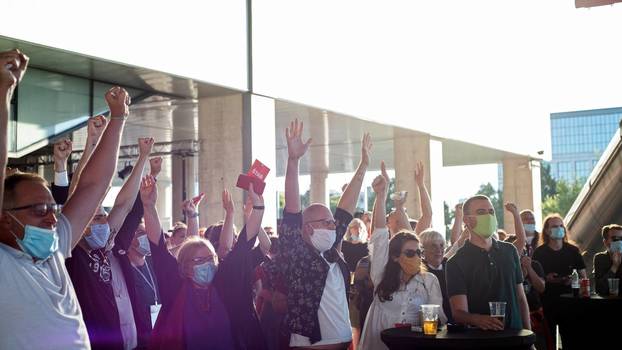
The parliamentary elections in Croatia are behind us and the conservatives, represented by the Croatian Democratic Union (HDZ), won by securing the 37.26 percent of the vote and 66 seats in parliament. It is one of the most decisive wins in Croatia’s brief parliamentary history, securing a very comfortable position from which Andrej Plenković, president of the HDZ and the current prime minister, can form a government. The win came on the shoulders of the government’s relatively fair and competent handling of the COVID-19 epidemic during the spring of 2020, demonstrated by the result for the current health minister, Vili Beroš, who won the single biggest share of the preferential vote among all candidates in these elections. Nevertheless, the conservatives’’ was also the result of a complete route of the Social Democrats (SDP) and their leadership, for whom this is one the worst defeats in their history.
Josip Jagić is a project manager and political analyst at the Rosa-Luxemburg-Stiftung’s Southeast Europe Office in Belgrade. He is also a member of Zagreb je naš!, one of the groups in the Možemo! coalition.
The HDZ was followed by its biggest opponent, the SDP, which led the “Restart Coalition” to 24.87 percent of the vote and 41 seats in parliament. The defeat was all the more bitter given that pre-election polling suggested that the SDP could emerge as the relative winner of the elections. Instead, basing its bleak campaign on corruption and incompetency charges against the HDZ, the SDP experienced a crushing defeat. The party’s prospects from here on out are fairly dim. Its defeat was first of all the result of a lack of leadership—an ongoing problem since 2016, when Davor Bernardić succeed Zoran Milanović as president of the SDP and thus leader of the opposition. Davor Bernardić has now resigned and the party will be looking for a new leadership in the days to come.
The third political force after these elections proved to be Domovinski pokret (Homeland Movement), led by the singer and former far-right presidential Miroslav Škoro, which secured 10.89 percent of the vote and 16 parliament seats. Škoro’s shares dropped substantially during election night as it became clear that the HDZ and Andrej Plenković had a such a good night that they could form a parliamentary majority without the far-right elements of the Homeland Movement. Conservatives from the coalition (the majority) won 7.39 percent of the vote, granting them eight seats in parliament. Liberals, gathered into three independent parties or lists (Pametno, Fokus and SSIP; HNS; Reformisti) won around 6 percent of the vote with only five parliament seats.
Twenty-four hours after the election the Croatian public agrees that there are two winners of these elections. One is the aforementioned conservatives around the HDZ, while the other is the emerging New Left gathered around a broad green-left coalition (Možemo!, Zagreb je naš, Nova Ljevica, Orah, Radnička fronta, Za grad). The coalition around Možemo! won 6.99 percent of the total vote and seven parliamentary seats. This constitutes the first time after the catastrophic defeat in the 1990s and the breakup of Yugoslavia that the Left in Croatia has representatives in parliament. One of the most prominent figures of the coalition, Tomislav Tomašević, finds the situation “a bit unreal. Six weeks ago we found out that we were headed for early elections. We had six weeks to roll out the campaign. We unified six parties, green and left, in one coalition. We gathered hundreds of volunteers who have done an monumental job. Compared to every other party we ran against, we didn’t have any resources. Four out of the six parties in the coalition don’t even have an office… But still, we made a miracle happen. Nevertheless, within that miracle the problem is the emerging right.”
Before the campaign, just six weeks ago, the Left was quietly hoping for one parliamentary seat, which could be won in Zagreb where the coalition’s infrastructure is the most extensive. Tomašević sees the results as a product of a decade of various activist struggles in local communities, on the street, and in local parliaments in Zagreb, Dubrovnik, and everywhere else in Croatia: “We have cashed in all of that work now… As have Bandić [the current mayor of Zagreb who did not win a single seat in parliament and is one of the biggest losers of this election] and the Restart coalition.”
The political landscape in Croatia is really changing. The broad green-left coalition based its electoral success in its ability to mobilize an impressive activist base in Zagreb, domating the streets. Sandra Benčić, another prominent figure from Možemo! and now a member of parliament, shares this view stating that “the results are beyond our expectations, which shows that Croatia really needed a new Left option. From now on it’s clear that the Left has a new name—it’s Možemo! and our coalition.”